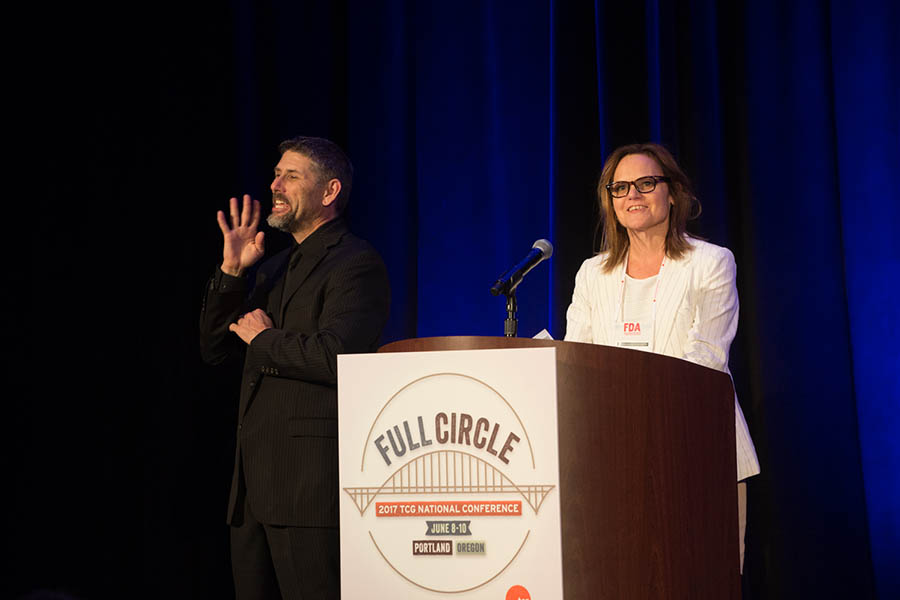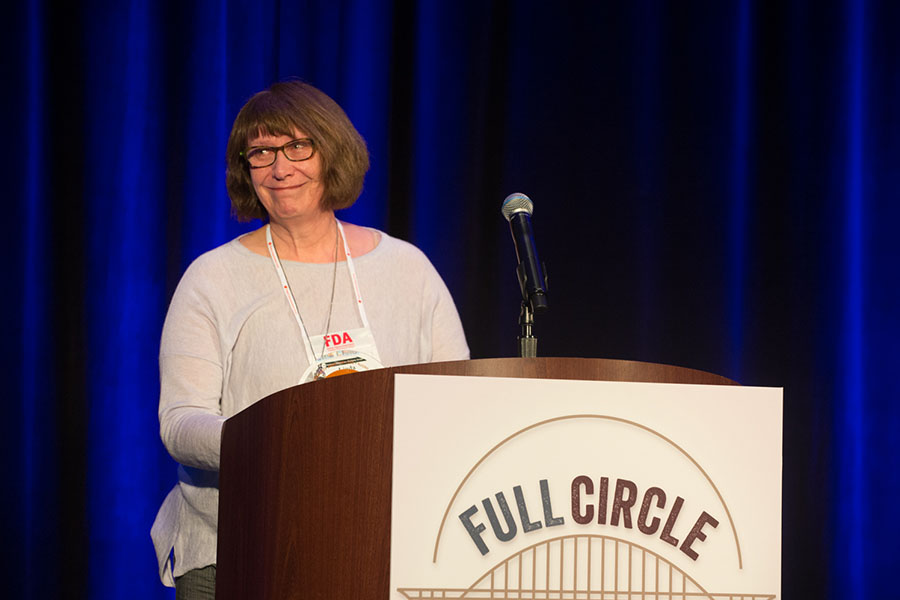PORTLAND, ORE.: Beginning with the dead and ending with the disenfranchised, the opening plenary of TCG’s national conference on Thursday evening at the Hilton Portland Downtown was a warm, sunny welcome to this rain-specked “maker’s” town, where more than 900 theatre folks from all over the U.S. have gathered to talk shop and strategize for the nonprofit theatre field’s future in an uncertain time.
“Portland is the liberal, quirky small town/big city The New York Times loves to write about and ‘Portlandia’ loves to parody,” said Cynthia Fuhrman, managing director of Portland Center Stage, in welcoming remarks that cited “chickens in the backyard, legal weed, lots of great beer and wine, food carts.” It is also, she noted, a place where a “long history of exclusion has a lasting presence that still holds us back today.” No one referred explicitly to the killing of Rick Best and Taliesin Namkai-Meche on a Max train on May 26 as they attempted to defend two young women from the harassment of a white supremacist with a knife, but they didn’t need to. That hideous crime—and subsequent clashes between so-called “alt-right” groups and progressive protesters—hover over this convivial moment as a bracing challenge for us all.
Sarah Horton, managing director of Artists Repertory Theatre, chimed in to say that “one of the things that gives us hope is our theatre community,” noting that two of the Northwest’s LORT theatres are in Portland, among around 80 theatre companies total. Fuhrman also offered a fun fact: This is the farthest west the conference has ever been held “by three points of a longitudinal degree.”
Opening remarks by TCG executive director Teresa Eyring referred to the “sanctuary city of Portland, where the police department personally invites refugees to the city,” referring to a striking post-show talkback on Wednesday night featuring Portland’s police chief, Mike Marshman, in which he and officer Natasha Haunsperger joined cast members and the director of Teatro de Linea de Sombra’s Amarillo at Portland Center Stage to talk about the city’s approach to the newly contentious issue of immigration and refugees.

That performance and discussion was part of an illuminating Global Pre-Conference, a gathering at PICA (Portland Institute for Contemporary Art) cohosted by the Global Theatre Initiative. And Thursday night’s plenary came after a day of meetings and sessions, a gathering of Intergenerational Leaders of Color, an artistic director “summit,” and morning field trips to an array of local “maker’s” spots: the Kennedy School’s converted hotel, where attendees had a late-morning beer tasting; Reed College for the Performing Arts; the arts hub ADX, where a screen-printing workshop was on offer; and Michael Curry Design, in nearby Scappoose, where the puppetmaster behind The Lion King and the upcoming stage Frozen let visitors see and touch some works in progress.
Eyring touched on the conference’s title, “Full Circle,” to note the “circular progress” of the field, in a space “somewhere between honoring the past and creating the future,” and encouraged attendees to “track our own lives on that circle.” She then cued up a look back at “those who’ve left our circle,” turning over the stage to a brief but moving procession of theatre practitioners who honored the leaders we’ve lost since last year’s conference in their own words: Zelda Fichandler, Jim Houghton, Gordon Davidson, Max Ferra, Miriam Colon, Martha Lavey, and Samuel G. Roberson Jr.
Honoring a still-living leader of the field, the Theatre Practitioner Award went to Linda Hartzell, artistic director emerita of Seattle Children’s Theatre, who began at the small company in 1984 and built it into one of the nation’s leading purveyors of theatre for young audiences before retiring last season. She accomplished this, she recounted, by insisting on as high a bar of professionalism for children’s theatre as in any other kind of theatre. “From one’s youngest years, art of the highest caliber should be part of everyone’s everyday life,” she said. “In TYA we always talk about our audience, and we realize what a responsibility we have in introducing people to theatre for the first time.”

One proof that her life’s work bore fruit came in the form of the gentleman who presented her the award: Seattle Repertory Theatre artistic director Braden Abraham, who got his first taste of live theatre from SCT and grew up being inspired by their work. Hartzell closed with a more generally applicable charge to her colleagues, phrased as a humble observation: “Like many of you, we work to convince our audience that theatre is not elitist, boring, or disconnected.”
Theatre is also resourceful: In a notable demonstration of showbiz axiom “the show must go on,” keynote speaker Cheryl Strayed, author and Portland icon, had cancelled her appearance that morning due to bronchitis and fever. She sent in her place Lidia Yuknavitch, an author and teacher based in Oregon, who gave herself a self-effacing introduction about her fleeting acquaintances with the theatre, mostly as an observer, before launching into an extraordinary essay about the people to whom she teaches writing at a community college in Gresham, just east of Portland, and the way their lives—in all their brokenness and seeming dysfunction—are not so removed from ours, in fact they are crucially intertwined.
She spoke of her students: of a man who’s currently writing eloquent essays from jail, despite her best efforts in a hearing with prosecutors to convince them that his writing had already transformed him; of a homeless single mom, a disabled veteran who dreams of becoming a teacher; of a young woman from an abusive family who’s now a physicist at the Large Hadron Collider, CERN. Yuknavitch called hers “the classroom of American broken-down dreams,” where there’s “no way to get out of the room until you spend some time together, as on a bus, or the Max.” Or, she might have added: the theatre.
Without leaning on the cliche that “art saved her,” that was the story Yuknavitch came to tell: of her own and her students’ stubborn realization that “wanting to be an artist might not be nutbag.” Her testimony—which included confessions from her own rocky past—rose to a quietly stirring conclusion as she urged attendees “to figure out how braid our languages and our differences before they separate us into camps where we all hate each other.” And she offered her hope that “we all begin to recognize how much we need to change in the face of our current culture. We all carry traces of one another. And our languages may yet reach one another inside our differences.”
Her final admonition touched on themes not only of inequity but of appropriation and plunder that are already running through sessions at the conference: “We need to stop treating the people, like women, like people of color, like LGBT people, like poor people, like people who’ve screwed up, as the raw material for building the rest of culture. My hope is that we can treat the people who’ve been used to make everyone else look shiny as our brothers and sisters.”


